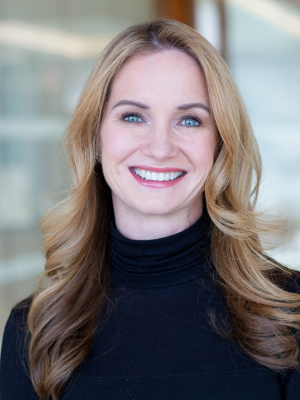 “I always tell people that the key to my success is loving what I do, because when you truly enjoy your work, it shows—and clients can feel that,” says Maureen O’Connor. “Over the years, my clients have seen that I care as much about the outcome of their transactions as they do, and that has been crucial to building strong relationships.”
“I always tell people that the key to my success is loving what I do, because when you truly enjoy your work, it shows—and clients can feel that,” says Maureen O’Connor. “Over the years, my clients have seen that I care as much about the outcome of their transactions as they do, and that has been crucial to building strong relationships.”
Exuding passion and enthusiasm, O’Connor demonstrates how loving what you do and honing your emotional intelligence are essential to long-term success. She reflects on the importance of skillful communication, maintaining in-person connections, and prioritizing finding work that is deeply fulfilling for a sustainable career.
Fueled by the Energy of the Markets
Dynamic and driven, O’Connor has always thrived in high-energy environments, making the fast-paced trading floor the ideal fit for her career.
“I love the markets and how what you read in the press that morning is going to have an impact on what you do that day. It’s exciting how things are ever changing, and that no day is like the last.” This unpredictability, far from overwhelming, is the fuel that powers her. “The buzz of a trading floor is the energy that I thrive off of.”
O’Connor feels fortunate to have built a career that still ignites her passion, even after more than two decades in the industry.
“It hasn’t felt like work in that regard. I really enjoy what I do—it fulfills me on a very deep level.”
O’Connor’s talents particularly shine as Wells Fargo’s Global Head of High Grade Debt Syndicate because the role is more about building connections with clients and finding a way to bring two sides together than it is about selling.
“My goal is to be upfront about what we can accomplish for you, and I love that. I enjoy being direct with people.” She continues, “it’s about finding that perfect balance between what the investor and the issuer wants, ensuring that neither feels like they got the upper hand, but rather that the outcome is fair.”
Building Stronger Client Relationships with In-Person Connection
Given that much of O’Connor’s role involves balancing both sides of a deal, she believes forging strong client relationships is essential—and in her view, the best way to do that is in person.
“I’m not one for small talk—I love real conversations,” she says. ” In my view, in-person connections with clients are critical – it’s harder to build a serious and deep connection with someone virtually.”
O’Connor believes that in-person meetings, preferably outside the confines of a conference room, are where true bonds are formed.
“I love to hear people’s stories, to understand what makes them tick,” she explains. “It’s not about using that knowledge to get something for myself; it’s about figuring out what’s going to work for them.”
While her job in syndicate is to carry a deal across the finish line, O’Connor sees it as much more than just completing a transaction.
“All the work you do leading up to that moment, getting to know your clients better, makes the final leg so much more meaningful.” This personal touch, she believes, is what sets her—and others in her line of work—apart.
Delivery is Key
For O’Connor, mastering the art of communication has been another key element to her success. While technical skills and attention to detail are critical early in one’s career, she believes that as you advance, it’s the softer skills that become more significant.
“I think having a high emotional intelligence (EQ) is really important,” she says. “When you’re a junior, it’s all about analytical skills and efficiency. But as you get more client-facing, it becomes much more about how you deliver.”
O’Connor prides herself on her ability to read people and adapt her approach accordingly. “I used to joke that the number one skill in my job was sounding good on the phone—now, it’s probably sounding good on Zoom,” she laughs. For her, clear and confident communication is essential. “It’s not just about what you say, it’s about sounding good saying it.”
Not only is confidence key, but making the delivery dynamic and engaging is essential as well. She emphasizes that effective communication is about more than just data—it’s about ensuring that the message sticks.
“Delivery is so important, and I don’t think people spend enough time polishing it. They work too much on the content and not enough on thinking about how to say it with emphasis in a way that leaves a lasting impression.”
The Art of Navigating Difficult Conversations
O’Connor points to another crucial element of communication—adeptly navigating hard conversations—as an asset in her role. Working in syndicate, she walks a fine line between the demands of issuers and the expectations of investors, advocating for both sides with skill and empathy.
“You get one of those tough trades, and sometimes the music stops. Your ability to deliver bad news becomes crucial.” She continues, “the way you handle those hard conversations is a critical skill that sets apart the good from the great at this job.”
O’Connor believes her success in this area comes from her ability to communicate directly. “I always ask myself, ‘How would I want to receive this news?’ And the answer is usually straightforward: I’d just want to know,” she says. This candid approach earns her respect, even when emotions are running high.
“It’s about your ability to impart to them, ‘this doesn’t feel good on this side, either. We’re not where we want to be, but we’re going get you to the best possible place we can’.”
O’Connor finds that approaching difficult conversations with a “we’re in this together” mindset not only reassures her clients but also fosters a collaborative atmosphere that helps navigate tough situations.
Passion is Preferable
O’Connor is clearly passionate about her work but acknowledges that there is a balance between caring deeply and maintaining emotional resilience.
“It’s hard not to take things personally when you care a lot. I’d tell my younger self not to stress so much.”
Yet, she emphasizes that bringing passion to the job is not only acceptable but essential.
“One of the worst pieces of feedback a woman can receive is being told she’s too emotional,” she shares. “It’s unhelpful. Asking someone not to care is not a solution. I love passion. I can help rein in or smooth the edges around that, but I can’t make somebody care about something they don’t care about, so I’d much rather somebody go in that direction than the other way around.”
In her view, the goal isn’t to care less, but to take things less personally.
“I’m not going to ask people to be less emotional. I might ask you to hone your reaction but never to care less.”
For a Sustainable Career, Love What You Do
For O’Connor, having genuine passion for one’s work is truly the foundation of a sustainable career.
“You have to ask yourself why you’re entering this business,” she advises. “Have a heart-to-heart with yourself, especially in those early years when sacrifices are abundant. If you’re in it for the wrong reasons, you won’t last. You have to truly love what you do because, ultimately, the money alone won’t sustain you.”
O’Connor encourages aspiring professionals to reflect on their motivations and be open to trying different roles to find their passion. She shares that she bounced around early in her career before finding her fit in syndicate in 2006.
“Don’t be afraid to pivot early in your career,” she stresses. “You must find that role that makes you happy. Otherwise, with the long hours and demanding nature of the work, you’re not going to thrive. You need to be in a seat that you genuinely love.”
As a mother of three girls, O’Connor aims to show her daughters that it’s possible to pursue a career she loves while finding deep fulfillment in her family life. For her, it’s less about achieving perfection and more about showing the importance of hard work and learning from mistakes. In her downtime, O’Connor spends quality time with her three daughters, loves baking and playing mediocre tennis with friends – simple joys that keep her connected to what matters most.
By Jessica Robaire


